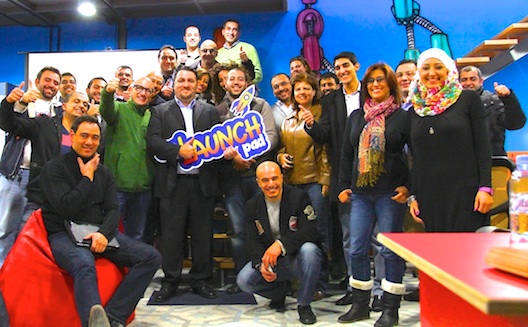Amman Gets Its First Co-Working Space

 After 25 years of his life in the corporate world, working for giants in Jordan like Nuqul Group, it’s fair to say that Nidal Eses has gained insight into the economy of big businesses in the Middle East.
After 25 years of his life in the corporate world, working for giants in Jordan like Nuqul Group, it’s fair to say that Nidal Eses has gained insight into the economy of big businesses in the Middle East.
After the economic crisis of 2008, he saw many of his peers turned to entrepreneurship. Now, he’s supporting startups with Eses4 Ventures, an investment-holding company that focuses on “Caring Capitalism,” and by building an element that Amman’s ecosystem dearly needed: a co-working space. With Zee Launch Pad, he hopes to give help professionals become part of a performance-driven community.
Entrepreneurs often try to begin their businesses by working from home, but “there’s no structure and no community,” says Eses. Working from a café is difficult for similar reasons. Entrepreneurs can spend their savings on renting a small office, but “the set up cost can be very high,” Eses continues.
Enter Zee Launch Pad, where entrepreneurs and freelancers can now subscribe to rent workspaces, and connect with reliable internet and phone lines, not to mention each other. An equipped conference room can be reserved online, and events bring experts and potential investors into the mix.
Enhancing Diversity
One twist that Eses is adding to the typical hub model is a focus on diversity. “We try to make tenants different in terms of talents, expertise, niche and background, to create a fusion for them to interact and benefit,” he explains. It’s an odd model that could cause tension if, say, a graphic designer applies for desk space and is rejected because the office already hosts a graphic designer at another company. Yet Eses thinks it is necessary to have a controlled environment to create a self-disciplinary community.
It’s all about creating a culture of performance, he says, noting that he built the entire place himself within two months. “I went wacky with the design and the place runs itself; everything is automated. It’s a completely new concept.”
The Revenue Model
Zee is not run to make a large profit, says Eses. Yet to sustain the space, he keeps running costs low, renting a space in Jabal Lweibdeh, a residential neighborhood with a few art galleries, and automating the lights and AC to save energy, as well as the the phones and Wi-Fi locks, to eliminate the need for a receptionist.
The space does, of course, charge for memberships. For 100 JD (US $140) per person per month, a first tier membership grants access to a virtual desk with fast internet and a printing service. Space is reserved on a first-come-first-served basis, and residents buy their own tea or coffee.
For 225 JD ($ 318) per person over three month, a second tier membership grants a dedicated desk in an open office space and access to a large conference room, printing from home, fast internet access, a phone line with voicemail, as well as free coffee and tea.
If you prefer to have your own small office, a third-tier membership, for 325 JD (US $ 458), offer a shared closed space that will fit three people. The membership application as well as the full range of options are available on the Zee Launch Pad site.
To make the process simple, registration and payment are all handled completely online, as is reserving the conference room. I was a little worried that building a community will be hard with almost zero human interaction, but Eses says that when it comes to logistics, “we want to minimize human intervention, human cost, uncertainty and therefore error.”
Inspired by co-working spaces in the U.S., this trend continues to appeal to those looking for alternative and unconventional workspaces. With Zee as the most recent addition in the region, it’s clearly a trend sweeping the Arab world as well (to see more, check out these 10 popular co-working spaces in the Arab world).


